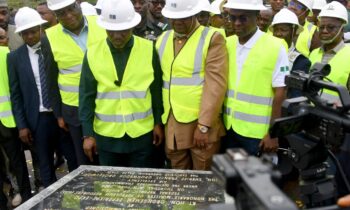Nothing like it in recent memory in Ndokwa West Local Government Area of Delta State! Two multibillion-naira assets of strategic importance to the nation, commissioned simultaneously on Thursday, June 6, by no less a personality than the Minister of State for Petroleum Resources (Gas), Rt. Hon. Ekperikpe Ekpo.
It signaled the full commencement of operations at the 300 million standard cubic feet per day (MMscfd) Kwale Gas Gathering (KGG) Hub and Nedogas Modular Gas Plant by the project promoter, Nedogas Development Company Limited, a joint venture company between Nigerian Content Development and Monitoring Board (NCDMB) and Xenergi Limited, an indigenous company.
It was the latest in a string of successes recorded by the NCDMB in strategic partnerships, most notable among which are Waltersmith Petroman Oil Company Ltd, owner and operator of the 5,000-barrel per day Waltersmith Modular Refinery, Ohaji-Egbema Local Government Area, Imo State, and Duport Midstream Company Ltd, owner and operator of Duport Energy Park, Egbokor, Edo State.
To the Minister and chief executive officers (CEOs) of the federal agencies at the June 6 event, it was an occasion for celebration as the facilities came on stream, a remarkable milestone in the actualisation of Federal Government’s Decade of Gas Programme, launched in 2020, and the Nigeria Gas Flare Commercialisation Programme, initiated earlier in 2015. In that commissioning ceremony also was sufficient evidence of NCDMB’s dedication to creating in-country value through strategic partnership with indigenous oil and gas companies.
What the HGG Hub and Nedogas Plant Mean to Federal Government
The Minister, Rt. Hon. Ekpo, said the event represented “a significant advancement in the country’s efforts to promote sustainability, energy efficiency and economic expansion.” Also, that it marked “a major turning point in Nigeria’s continuous quest to use its abundant natural gas resources for the country’s development.” Evidently gratified, he declared, “It gives us [Federal Executive Council] immense pride.”
By the reckoning of the Federal Government the facilities would solve “a persistent environmental issue” through the process of capturing associated gas that would otherwise be vented. The process, he noted, “turns a potentially waste product into a useful resource.”
In a summation of what the KGG Hub and Nedogas Plant mean for the country, the Minister declared: “A greater supply of gas will boost the electricity supply to industry, improve industrial productivity, and offer more environmentally friendly home energy options. Thus, our people’s quality of life will improve, sustainable development will be promoted, and Nigeria will be positioned as a major player in the world energy market.”

He would not leave out the agents of what he described as “these outstanding initiatives,” to whom he paid glowing tribute.
The Minister and NCDMB’s Strategic Partnerships
According to Rt. Hon. Ekpo, “The NCDMB and Nedogas Limited, of which Xenergy Limited is a part, deserve praise for their tireless work and steadfast dedication to this admirable cause.” Their collaboration, he emphasised, “serves as evidence of the effectiveness of our local content policy, which seeks to increase the involvement of Nigerian businesses in the oil and gas industry while promoting local knowledge and capability.”
He said creative engineering and forward-thinking planning on their part, as well as joint public-private sector efforts, had made the monumental accomplishment possible.
From several CEOs and dignitaries were similar outpourings of praise and pledges of continued collaboration and support.
Engr. Felix Omatsola Ogbe on Principles that Guide NCDMB Interventions
The Executive Secretary spoke as industry regulator and chief implementor of Nigerian Content as enshrined in the Nigerian Oil and Gas Industry Content Development (NOGICD) Act, 2010. He was categorical about the vision and mission of his agency and the mode of its interventions to advance the objective of local capacity building and utilisation of in-country resources.
He said, “We are proud of our strategic projects we are developing in partnership with other [Nigerian] investors in the last 10 years, especially in the gas sector. These projects are geared towards actualising the Federal Government’s policy direction. We would like to emphasise that NCDMB is a business enabler, not just a regulator of local content.”
According to Engr. Ogbe, “Our mandate under the NOGICD Act is to promote development and utilisation of local capacities in the Nigerian oil and gas industry,” and that the facilities would also “serve as catalysts for local content development, job creation,” and a lot else.
Pursuant to that mandate, the Board had ensured utilisation of local capacities on an unprecedented scale in the construction of the Nigeria Liquefied Natural Gas (NLNG) Train 7 project, resulting in 50 per cent domiciliation of the US$12 billion expenditure. And only recently, NCDMB teamed up with SEPLAT Petroleum Development Company Ltd to build a world-class gas development research facility at Delta State University, Abraka, to develop local capacity.
As he rounded off his address, Engr. Ogbe declared, “We are not just celebrating; we are reaffirming our commitment to the principle of Nigerian Content development. According to him, “NCDMB will continue to support initiatives that promote local content, drive economic growth and improve the quality of life of all Nigerians.”
A Partner’s Sense of Fulfilment
The Nigerian Gas Infrastructure Company (NGIC), a subsidiary of the NNPCL, was proud of the accomplishment recorded in conjunction with Nedogas and other partners. A representative of the Managing Director, Engr. Terkula Gberindyer, Manager, Commercial and Business Development, declared: “We are particularly excited because of the multiplier effect this facility will have on Nigerians and advancement of Federal Government’s drive to industrialise the nation with natural gas as the major feed,” he declared.
A Regulator’s Take
The Commission Chief Executive (CCE), Nigerian Upstream Petroleum Regulatory Commission (NUPRC), Engr. Gbenga Komolafe, said Nedogas and its partners have proved to be worthy industry players by the thoroughness with which they executed their project.
A representative of the CCE, Chief Ogunnubi Olusegun, Regional Coordinator of the Commission, said, “By pushing the boundaries of energy production capacity, you are setting a commendable standard for others to aspire to.”
Goodwill Messages
The Delta State Governor, Rt. Hon. Sheriff Francis Oborevwori, represented by his Deputy, Chief Monday John Onyeme, expressed happiness that his State is playing host to such an important project which would address the energy needs of Nigerians.
He said the economic importance of the KGG Facility and Nedogas Plant would be best appreciated if placed within the context of the energy crisis in the country. Citing World Bank statistics, he stated that power supply is so poor that companies spend as much as $29 billion yearly to remain in business, and that “the country is ranked as the lowest in terms of access to electricity globally.”
Remarks by Nedogas Chairman
Earlier in his Welcome Address, the Chairman of Nedogas, Engr. Emeka C. Ene, expressed appreciation to partners in the two projects that had contributed to the success being celebrated at the commissioning ceremony. He was particularly impressed with NCDMB’s strategic capacity development initiatives under successive Managements, from Engr. Simbi Wabote to Engr. Felix Omatsola Ogbe.
Engr. Ene pointed out that the KGG Facility and Nedogas Plant are in alignment with Federal Government’s ‘Decade of Gas’ initiative which continues to be promoted. He was equally upbeat that the location of the KGG hub, close to the Delta State Industrial Park, would significantly enhance economic activities and development of the State.
Located in the heart of Umusam community, near Kwale, the gathering facility would ensure that “All the stranded gas in the area is… harnessed for the benefit of the people.”
On the wider significance of the KGG Facility, he noted that “This is a modular plant; it can be replicated 10 times over,” and that similar facilities need to be developed to deal with the 140 flare sites in the oil-producing areas.
Special Recognition for NCDMB Directors
Two top Management staff of the NCDMB, Dr. Ama Ikuru, Director, Corporate Services, and Engr. Abayomi Bamidele, Director, Project Certification and Authorisation Directorate (PCAD), were given special recognition for their top-grade input in the management process of the projects.
Other key personnel of the NCDMB at the event were Barr. Esueme Dan Kikile, General Manager, Corporate Communications/Zonal Coordination, Mr. James Eyetiyah, Zonal Coordinator, Edo/Delta, and Mr. Obinna Ezeobi, Deputy Manager, Corporate Corporations Department.
Value Proposition for KGG Facility
As explained in the company’s brochure for the commissioning ceremony, the value proposition in respect of the KGG Facility is as follows:
- Total eradication of flared gas and conversion of an environmental pollutant into products of value
- Creation of a strategic gas gathering hub and injection node for quick access to market for gas owners to monetize gas
- Provision of alternative gas supply to the Western flank of the OB3 line to add to required volumes for economic sustainability of the line
Contribution of up to US$240 million per annum to Nigeria’s GDP within the first 4 years through trunk line tariffs, liquid product sales to off-takers and other infrastructural tariffs and tolling revenue due to the network and trunk line operators.




